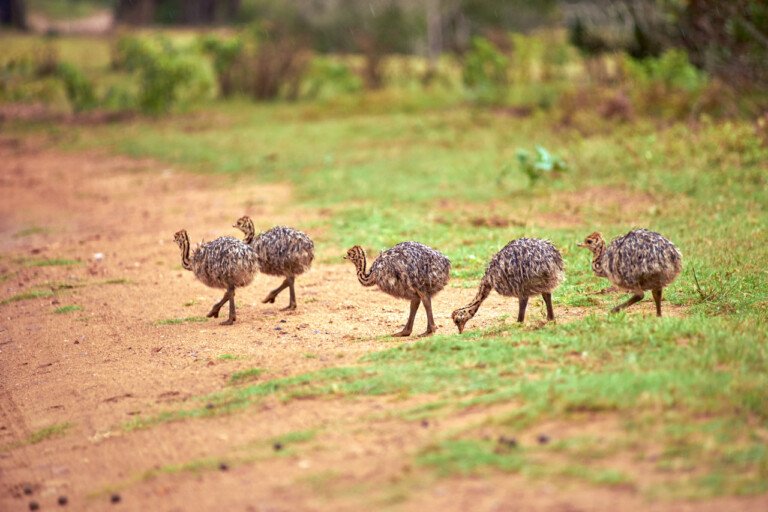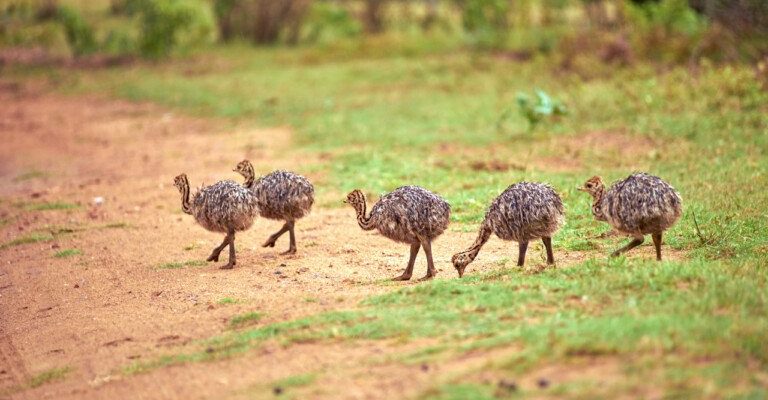
Imagine being a baby emu, hatching from your egg and immediately being thrust into the vibrant, often challenging world around you. The way emus nurture their chicks is quite a journey, full of lessons about growth, independence, and survival. If you’ve ever wondered how these incredible birds manage the parenting game in the wild, let’s dive into that together.
The Emu’s Unique Parenting Role
Unlike many animals where females do most of the parenting, emu dads take the lead when it comes to raising the young. After a female lays her eggs, usually around 10 to 15 eggs, she leaves them with the male. Here’s the thing: it’s the dad who incubates the eggs for about eight weeks. He guards them fiercely, ensuring they’re safe from predators and bad weather. You could say he’s the original “hands-on” parent.
Once the eggs hatch, he doesn’t just kick back and relax. Instead, he becomes a full-time caretaker for the new chicks. It’s not just about keeping them warm; he’s also teaching them crucial survival skills. This nurturing behavior highlights a strong bond between the father emu and his offspring, which is quite rare in the animal world.
The Hatching Process
So, what does hatching look like for emus? After those long weeks of waiting, the chicks begin to pip—this is when they break through the shell. Each chick has a unique method of getting out, using its egg tooth, a small, hard bump on its beak, to crack the shell open. It’s like a little emu magic show!
Once they hatch, the chicks are covered in soft, fluffy down feathers. They might look a bit awkward at first, but they are ready to follow their dad within a few hours. Isn’t that amazing? They’re born with an instinct to stay close to their father, who will lead them to food and water sources. This instinct is crucial because, in the wild, safety is everything.
Feeding and Learning
When it comes to food, emu dads are pretty attentive. They lead their chicks to various food sources, which can include seeds, fruits, and even insects. Here’s a fun fact: emus have excellent eyesight and can spot food from a distance. They also teach their chicks what’s safe to eat and what to avoid. This is a vital lesson in survival.
Chicks learn by watching their father. If he shows confidence and inquisitiveness in trying new foods, they are more likely to mimic that behavior. Honestly, it’s a lot like kids watching their parents at the dinner table. They soak up what they see and learn from it!
Protection from Predators
Emu dads are also vigilant protectors. In the wild, there are plenty of threats, like foxes and large birds of prey, that may want to make a meal out of baby emus. Here is where the father’s protective instincts shine. He’ll keep a close eye on his little ones, using his size to ward off any potential threats.
If danger approaches, the male emu can create a distraction. He might stomp around or make loud noises to draw attention away from his chicks. This behavior highlights how resourceful these birds can be, ensuring the survival of their young. Emus are clever, and their parenting skills reflect that!
Fledging and Independence
As the weeks go by, emu chicks grow quickly. They start to develop feathers and can begin to take short flights. Can you imagine watching these tiny birds take off and land clumsily? It’s a sight to behold! By the time they’re about six months old, they are almost fully grown and can fend for themselves.
However, it’s not just about becoming independent. Emu dads teach them life skills during this time, from finding the best food to navigating their environment. It’s a gradual process, much like how human parents guide their children toward self-sufficiency in small steps.
The Importance of Social Learning
Emus are social creatures, and their interactions play a big role in raising their young. Chicks often learn from each other as well as from their father. They engage in playful behaviors that help them develop social skills necessary for adult life. Imagine a group of young emus frolicking around, picking up what they need through play and imitation.
This social learning is vital, not just for survival but also for establishing relationships within the flock. They form bonds that will help them navigate the challenges of adulthood, much like how friendships can shape our lives.
Raising emus is no small feat, especially considering the challenges they face. But the way these birds embrace parenting—especially the dads—is a beautiful example of dedication and love in the wild. From incubating eggs to teaching life skills and protecting their young, emu fathers display amazing qualities that help them thrive.
So, the next time you think of parenting in nature, remember the emus and their incredible journey. It’s a world full of lessons about resilience, teamwork, and growth. Isn’t it fascinating how different species approach the same responsibility? Nature truly has its own way of impressing us, one little emu at a time.

